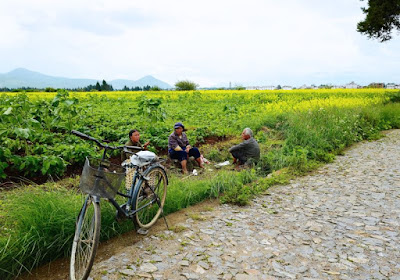Since I was first acquainted with my grandfather and dad's vintage Hasselblad 1000F and 500 C/M, a camera follows me around everywhere in a bag on most days. But I don't need it to fit nicely in my pocket. The compacts aren't fun enough.
The process of understanding a new camera is a joy (not an addiction), and knowing what kind of photos I'm inclined to shoot usually decides the main lens I use on a daily basis. Of course I do have other lens for various purposes, but as far as buying glass goes, I'm a conservative consumer. Honestly, all I need is two sets of lens on a body, that's all. Not a pro photographer. Don't need that sort of ammunition. Obviously I don't take photos for the sole reason of blogging. But neither do I share them online nor with the friends. No such thing as a travel album in facebook or elsewhere. Don't even bother with the ever-annoying Instagram. I stash them in uhh... hard disks, for my own viewing pleasure.
Went for a half-day introductory Leica Q photography workshop with Mathias Heng to hear his rich experiences, and to understand more about this newest addition to the uhh family. No better than have the professionals share their opinions. The first portion of the workshop was a yawn. The second part was very welcomed. It comprised of a quick stroll outdoors to get some shots and check out exposure, then back to the room to look at Mathias' framing and composition of shots in various cities and situations. That was what I was hoping to see at the workshop that had to have its content be pitched at a general audience.
I lugged this baby all around Zhongdian and Lijiang as a really useful full frame fixed lens point and shoot. It's such a delight discovering its quirks and functions for every situation. But yes, I'm well aware of the limitations and merits of a Leica. I have two of them, and now a third. They're intended to be used at different occasions. I love shooting stills and in manual, but sometimes, a quick-focus auto works better. I've come to realize that zoom or image stabilization isn't required in any of my cameras. I don't shoot that way. It took years, but this Leica Q has finally caught up with the rest of the available technology in cameras. However, it isn't as snazzy as say... possibly the newer yet-to-be-released model of the 2013 Sony RX1. What can I say? I used various models of Lumia on Windows OS mobile for years.
I love photography, but I'm not enthusiastic about joining hobby groups and heading out on shooting trips. I want to hear pro tips, but only from friends or photographers whose work and attitude I greatly admire. I'm not keen to like...talk in depth about it with acquaintances or fellow workshop participants. Okay, I'm not friendly lah. Yeah I stalk the forums though. It's the same attitude I have since schooldays. If I could opt out of group projects, I will. Solitude is generally preferred. Anyway, the whole point is to 'get out and shoot'. That, I always do.
 |
| Shot in manual mode on the Q. But clarity isn't the best in this file—super downsized the pixels for the blog. |













































